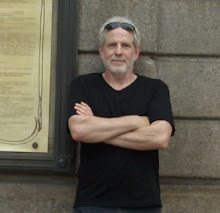It's been just over two years since my father-in-law, Morey Hunter, passed away at the age of ninety. During the thirty-five years that I knew him, he never once spoke voluntarily about his service during World War II.
For Morey not to speak about a subject was unusual. He was a garrulous and highly opinionated man, operatic in tone and sentimental by nature. Where family and close friends were concerned, he didn't just wear his heart on his sleeve, he gave it to you wholesale. He was a tireless worker, a dapper dresser, a fastidious cleaner, and a rabid Yankees fan which led to some truly hilarious banter with his New England transplant daughter. He loved to argue, waxing both poetic and crude about politics, movies, sports, and the quality of the fruit at various local markets about which he was more fanatic than he was about the Yankees. But about the war, he would say almost nothing.
Because of his reticence, the details of his service are sketchy. He was sent overseas in 1944 as a radar specialist with an artillery battalion. He saw service in North Africa, Italy, France, and Germany where, being a natural if untutored linguist, he became a German translator despite only knowing Yiddish. He arrived in Dachau the day after the camp was liberated.
If pressed, he would tell us some of the more humorous incidents that befell him in Europe - the time his rifle split during guard duty in a rain storm or the time his precious supply of canned tuna from home was destroyed by German artillery. But even in these stories, there was always an undercurrent of the fear and brutality he'd experienced, the sense of isolation he'd felt as a young man far from family and home and in constant peril.
Only twice did I fully see the psychological scars the war had left on him. The first was in the summer of 1999 during a family vacation in Italy. We were driving from Tuscany down to Naples, the car ringing with laughter over some forgotten travel mishap, when Morey suddenly became quiet and withdrawn. I asked him if he was okay, and he simply said that he'd been there before. I looked up at an approaching road sign: Monte Cassino. He had been present at one of the bloodiest campaigns of the war.
The second time was in the spring of 2003 when Morey received a cryptic phone call from France to his Florida home. Given the bad connection and his partial deafness, he couldn't understand much of what was being said but managed to get enough information for me to follow up. The call was from a French family, the Merciers, who had befriended him and a GI buddy while they were stationed in Épinal after the liberation of France. The father, Marcel, was a young boy at the time but had very clear recollections of the time he spent with the Americans. In broken English, he wrote Morey the following:
"The last time I saw [you] was some weeks before Christmas and [you] should have come to dinner but [your] unit moved some days before...and we were very sad."
"Please [know] the friends who are dead for the France are not dead for nothing. French people love their American friends...I wish to your family a good health and I address you my good and faithful memory."
When we asked Morey what he would write in return, he looked at us sadly and said, "I can't. You write him back." We were stunned and pressed the issue. This family had gone through a tremendous effort to make contact; how could he not reply personally? He got mad and told us again that he couldn't and wouldn't. The pain of remembering was clearly much deeper than we imagined. We never brought up the subject again.
Morey was among the fortunate who returned from the war. He married, raised a family, prospered in business, and lived a full, rich life. But it would be thoughtless of me not to remember him today for his service to this country and for the sacrifices he and countless others made for the freedom of the world.


beautiful
ReplyDeleteThis is a beautiful tribute to Pop. I miss him so much.
ReplyDelete